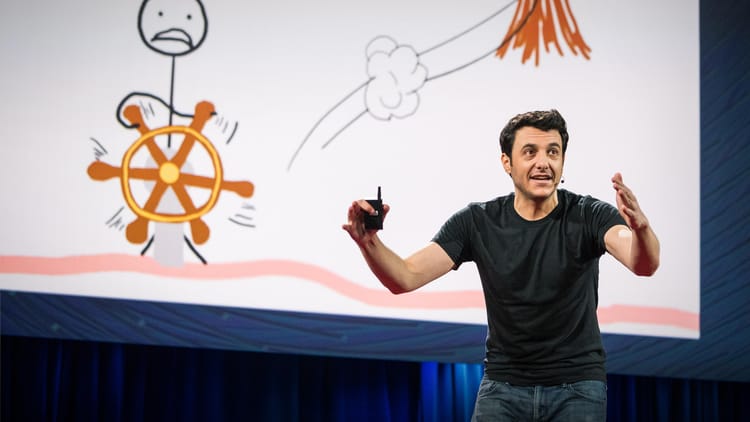“Inside the Mind of a Master Procrastinator” by Tim Urban
• public
Table of contents
Urban humorously delves into the psychology of procrastination, offering insights into the mind of a procrastinator and providing strategies to overcome this common challenge.
For Key Ideas, Questions and Quotes from this talk, you can scroll below.
Tim Urban gave this speech at the TED Conference. All rights to the speech and the video above belong to TED.
About Tim Urban
Tim Urban has become one of the Internet's most popular writers. With wry stick-figure illustrations and occasionally epic prose on everything from procrastination to artificial intelligence, Urban's blog, Wait But Why, has garnered millions of unique page views, thousands of patrons and famous fans like Elon Musk. (Source: TED)
Key Ideas From Talk
Are you one of those who stay up all night on the last evening of an assignment or exam? Or someone who completes a three-month project in the last week? Are you one of those who can't do a job until the last minute, and then blame yourself like crazy?
I am one of those people. It seems that Tim Urban, who is also a blogger, is one of them, too.
Tim has analyzed this procrastination situation. He has thought about it because he experiences it frequently. It turns out that the problem is not actually procrastination in studying for an exam, doing a project, or anything similar. The answer to the problem lies in something that bothers us throughout our lives. If you're curious, I recommend watching the talk. However, I can share some ideas from it;
- The "Instant Gratification Monkey" and the "Rational Decision-Maker": Tim talks about the "Instant Gratification Monkey," which represents our desire for immediate pleasure and distraction, and the "Rational Decision-Maker," which represents our long-term goals and logical thinking. The Instant Gratification Monkey often takes control and makes us procrastinate by choosing fun and easy tasks over important ones.
- The "Dark Playground" and the consequences of procrastination: Tim describes the "Dark Playground" as a place where procrastinators waste time doing unproductive things instead of working on what they should be doing. Procrastination can lead to stress, anxiety, and negative outcomes because tasks pile up, and we run out of time to complete them.
- The role of deadlines and panic monsters: Tim explains that deadlines and the fear of consequences wake up the "Panic Monster," a powerful force that motivates us to get things done. The Panic Monster can be both helpful and problematic because it often leads to a cycle of rushing and stress as we wait until the last minute to start working.
- Strategies for combating procrastination: Tim suggests setting small deadlines and finding ways to hold ourselves accountable to overcome procrastination. Breaking tasks into smaller, manageable parts and focusing on getting started rather than aiming for perfection can help us overcome the initial resistance to work.
- Embracing the importance of time and overcoming the procrastination habit: Tim emphasizes the significance of time and encourages us to be mindful of how we use it. By understanding why we procrastinate and how it affects us, we can take steps to manage our time better and develop strategies to beat procrastination.
Questions to Ask Ourselves
- How often do I find myself giving in to the "Instant Gratification Monkey" and choosing short-term pleasure over long-term goals?
- What are the main distractions or activities that tend to lure me away from the tasks I should be working on?
- Do I often find myself in the "Dark Playground," wasting time on unproductive activities instead of focusing on important tasks?
- How do I personally experience the negative consequences of procrastination, such as stress, anxiety, or missed opportunities?
- Are there specific strategies or techniques I have used in the past to overcome procrastination? How effective were they?
- What strategies can I implement to create small deadlines or hold myself accountable for completing tasks in a timely manner?
- How can I break down larger tasks into smaller, more manageable parts to reduce the initial resistance to start working?
- How mindful am I of the value of time and the importance of managing it effectively? Are there specific habits or behaviors I can change to make better use of my time?
Notes From Talk
Related List and Guide
This talk is a part of following list: "Talks That Changed My Perspective".
